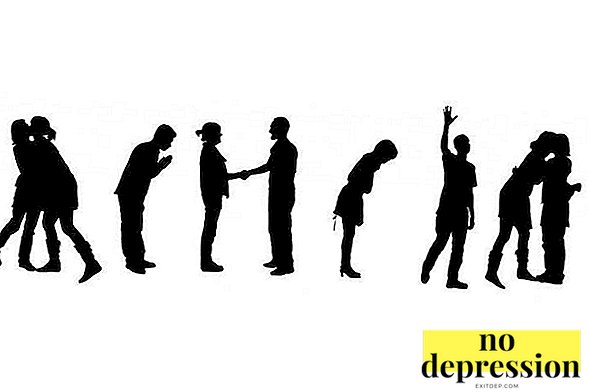Emotional intelligence - the most important component of a full-fledged personality.
The ability to cope with negative experiences depends not only on the mental state of a person, but also on his success, motivation and aspirations.
To learn to interact with yourselfIt is important to be able to recognize and deal with negative emotions.
The essence of the negative reaction

The word "emotion" contains the Latin root "moveo".
Literally it means "Move, come into motion".
Emotion is an instantaneous program of action embedded in a person’s subconscious.
Thus, negative emotion is a person's reaction to a situation that does not fit into his understanding of what is happening. Peculiar trigger forcing enable protective behavior.
In essence, a rational man - Homo sapiens - is driven by two powerful forces. This is the mind and emotions. At first glance, analytical skills seem much more useful than emotional reactions. However, evolution decided otherwise.
For millennia, man has been confronted with situations where emotions were decisive. In the face of danger, our ancestors did not try to analyze what was happening. Long reflections on how best to deal with the attacking predator, could cost them their lives.
Instant emotions came on the scene, followed by lightning solutions - defend, run, attack, hide, etc. A sense of fear, danger and anger saved a person, gradually turning into an automatic reaction to danger.
Negative, or negative, emotion occurs instantly and almost automatically. She is unconscious, but contains tremendous power. An individual, driven by such emotions, mobilizes all forces - speech arsenal, physical capabilities, speed of reaction.

Modern man rarely faces a direct threat to life.
Most negative experiences today "Grow" from other sources.
The older "This snake will bite me" was transformed into "This boss oppresses me."
Emotions have evolved along with the person, so today the negative experiences cause all the same lack of money or intrusive signal from a nearby car at the traffic light.
It would seem that a banal situation provokes the same reaction that was once caused by an attacking predator. The person instantly responds with rudeness to the irritant and “rushes” at the offender.
Groups of feelings
Human consciousness multifaceted. To understand whether the experienced feeling is harmful, it is important to be able to recognize negative experiences.
Any emotional states of a person are regulated. hormonal background. In response to external stimuli, the endocrine system produces certain substances.
Simply put, in case of danger, adrenaline is released, at the moments of pleasure - dopamine.
But the spectrum of feelings rarely provokes clear release of a single hormone. Any emotion consists of many facets, like the hormonal surge that caused it.

Recognizing a negative emotion is simple:
- Most often it causes arousal.. Even seemingly passive depression produces an active flow of thoughts and oppressive images. The nervous system is agitated.
- Impatience. Often there is a desire to act immediately. Inability to respond leads to stress. The subordinate who disagrees with the leader shakes his leg under the table or clicks a pen.
- Inability to concentrate. Emotions overwhelm the mind, so the logic is pushed into the background. Analyze once, you need to act.
Types of negative emotions
Gamma of human emotions - a huge world of feelings and experiences. There are both positive and negative emotions in it.
What refers to negative emotional states? List of basic negative feelings:
- anger;
- irritation;
- hatred;
- anger;
- fear;
- horror;
- angry;
- annoyance;
- resistance;
- disgust;
- alertness;
- anxiety;
- nervousness;
- scare;
- excitement;
- obsessive experiences;
- entanglement;
- isolation;
- oppression;
- despair;
- depressive feelings;
- vulnerability;
- helplessness;
- devastation;
- apathy;
- boredom;
- feeling lonely;
- shame;
- wine;
- embarrassment;
- shock;
- shock;
- sadness;
- disorientation.


The list of negative emotions can be continued for a long time.
It is unlikely that soul-bearers will ever be able to compile a complete list of negative feelings.
After all, emotions often intertwined, creating new shades of experiences.
How to overcome the experience?
If in the primitive world, negative emotions saved a person’s life, then in modern realities a flash of feelings can harm not only their source, but also those around them.
Control of the emotional background allows you to fully activate logical thinking.
but do not push feelings to the background. It is important to recognize them and be able to cope with the most destructive ones.
Understanding the source
To cope with negative experiences, it is important to understand the source that provokes them. More precisely, the source of experience is the very consciousness of man, but the irritant is most often the environment.
How to deal with the negative:
- The first step in the struggle will be the awareness of their experiences. “Yes, I am standing in traffic. I'm angry because I want to get home as soon as possible. But will my anger accelerate traffic? ”
- The next step is the inclusion of logic. We push the flash of emotions into the background and analyze the situation. “What can I do in this situation? Spend time with benefits. I read the book.
- Avoid irritants. If you get stuck on this street five times a week, you have two options: learn to suppress the negative or stop driving this way. If possible, eliminate from your life destructive situations that trigger outbreaks of negative.

The proposed chain can be used not only in the described example. Distance and rate your emotions as if from. Consider negative feelings separately.
You are not what you think. As soon as you learn to think not “Here is a scoundrel!”, But “I am furious,” you will learn and control your emotions.
Suppression of rage
Sudden rage becomes a real hurricane, destroying relationships and worsening health.

Imagine a situation where you walk along the sidewalk, and a passing car splashes you with water from a puddle.
You for sure go berserk, because "you could go more cautious."
The driver has already forgotten about you, but you carry your emotions home and will most likely throw them out on the first person you find.
Feeling that you are falling into a rage, stop a stream of angry thoughts and consider the situation from a different angle. Break away from the belief that your opinion is the only correct one.
Perhaps the driver is in a hurry to the airport or has just had a baby. Mix your anger with understanding or suitable neutral emotion. It will help extinguish the flame of rage.
Suppression of excitement
Anxiety often arises almost from nowhere. The excitement rolls into a snowball, and its owner is immersed in disturbing thoughts. Often anxiety, regularly fed, becomes habit.
As soon as the excitement begins to draw images of catastrophes in our thoughts, stop this flow. Mentally rewind time back and analyze the moment when the first exciting emotion of the chain arose.

Important get to the bottom of the process. Did you see the note in the newspaper? Heard a loud dog barking around the corner?
As soon as the starting point is found, we begin to devalue the risk of an accident.
What is the probabilitywhat event from the newspaper happen to you?
Are there other scenarios? Can I prevent this catastrophe?
In dealing with anxiety, a cold assessment of the situation and logical thinking will help. Healthy skepticism will gradually teach you to analyze possible incidents from a position of logic, and not flashes of emotions.
Ways to spill energy
No matter how effectively a person can cope with negative emotions, arising, they cause damage to the moral and physical condition. Survived stress often settled in the mind by heavy load. We dealt with the offender, the situation was decided, and the nervous tension is still there.
How to get rid? The condition of the tensioned string will help eliminate simple ways:
- Physical activity. Do some hard work or just go jogging. Switch consciousness, and soon it will relax and relieve anxiety from the experienced stress.
- Speak out. For this, it is not necessary to look for a listener. Write a letter to the person who pissed you off and tell him everything you think. Hide the sheet. If the negative begins to return, remove the letter and re-read it. You can make edits.
- Contact the outside world. This method is suitable when negative thoughts prevail.
Take a walk, feed the homeless kittens or go to the movies. Make sure the world has not collapsed, and everything goes on as usual.
- Shout. If you want to scream, turn on the loud music and sing along as sincerely as you can.
- Sleep. Give the brain a break from the strain, taking a nap.
- Treat yourself. Buy a cute trinket, evoking pleasant emotions. Allow yourself what was previously denied, be it candy or new shoes. Balance negative with positive impressions.

Negative Emotions - natural human reaction to unpleasant situations. To avoid negative experiences, it is important to be able to cope with them. The fight against the negative begins with an awareness of your own feelings. Easy ways to relieve nervous tension are also useful.
Negative emotions - how to cope with them? 2 simple methods:



